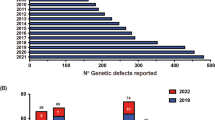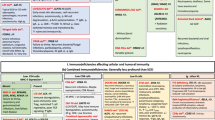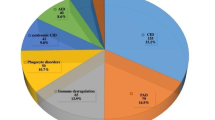Abstract
Purpose
IPEX (Immunodysregulation, Polyendocrinopathy, Enteropathy, X-linked) is a rare X-linked recessive life-threatening disorder characterized by autoimmunity and early death. Pulmonary complication related with IPEX has not been elucidated exactly. Here, we report 4 IPEX patients, 3 of which died from severe pulmonary disease.
Methods
Clinical data and laboratory findings including autoantibodies, immunoglobulin levels as well as number of T, B and NK cells were evaluated. FOXP3 expression and T reg activity were analyzed. The FOXP3 gene was sequenced and RNA analysis was performed.
Results
Patient I (PI) presented with nephrotic syndrome at 3 years of age and then developed autoimmune hepatitis without eczema, enteropathy or high IgE and died at 9 years of age due to acute respiratory distress syndrome (ARDS). Two cousins of PI had the same hypomorphic splice site mutation leading to a deletion of 27 amino acids, but normal FOXP3 protein expression and normal suppressive capacity of T reg in a proliferation inhibition assay. However, they exhibited typical symptoms such as eczema, diabetes and enteropathy with eosinophilia at early age (PII, PIII) and were transplanted in infancy. One of them had severe respiratory distress right after birth (PIII). Patient IV from another family presented with chronic diarrhea without autoimmune manifestations and died due to ARDS.
Conclusion
Lung disease related to IPEX syndrome has not been reported before and this entity could be a critical factor in disease outcome.


Similar content being viewed by others
References
Bennett CL, Christie J, Ramsdell F, Brunkow ME, Ferguson PJ, Whitesell L, et al. The immune dysregulation, polyendocrinopathy, enteropathy, X-linked syndrome (IPEX) is caused by mutations of FOXP3. Nat Genet. 2001;27:20–1.
Chatila TA, Blaeser F, Ho N, Lederman HM, Voulgaropoulos C, Helms C, et al. JM2, encoding a fork head-related protein, is mutated in X-linked autoimmunity-allergic disregulation syndrome. J Clin Invest. 2000;106:R75–81.
Gambineri E, Perroni L, Passerini L, Bianchi L, Doglioni C, Meschi F, et al. Clinical and molecular profile of a new series of patients with immune dysregulation, polyendocrinopathy, enteropathy, X-linked syndrome: inconsistent correlation between forkhead box protein 3 expression and disease severity. J Allergy Clin Immunol. 2008;122:1105–12.
Barzaghi F, Passerini L, Bacchetta R. Immune dysregulation, polyendocrinopathy, enteropathy, x-linked syndrome: a paradigm of immunodeficiency with autoimmunity. Front Immunol. 2012;3:211. doi:10.3389/fimmu.2012.00211.
An YF, Xu F, Wang M, Zhang ZY, Zhao XD. Clinical and molecular characteristics of immunodys regulation, polyendocrinopathy, enteropathy, X-linked syndrome in China. Scand J Immunol. 2011;74:304–9.
d’Hennezel E, Bin Dhuban K, Torgerson T, Piccirillo CA. The immunogenetics of immune dysregulation, polyendocrinopathy, enteropathy, X linked (IPEX) syndrome. J Med Genet. 2012;49:291–302.
Hashimura Y, Nozu K, Kanegane H, et al. Minimal change nephrotic syndrome associated with immune dysregulation, polyendocrinopathy, enteropathy, X-linked syndrome. Pediatr Nephrol. 2009;24:1181–6.
Wildin RS, Smyk-Pearson S, Filipovich AH. Clinical and molecular features of the immunodys regulation, polyendocrinopathy, enteropathy, X linked (IPEX) syndrome. J Med Genet. 2002;39:537–45.
Burroughs LM, Torgerson TR, Storb R, Carpenter PA, Rawlings DJ, Sanders J, et al. Stable hematopoietic cell engraftment after low-intensity nonmyeloablative conditioning in patients with immune dysregulation, polyendocrinopathy, enteropathy, X-linked syndrome. J Allergy Clin Immunol. 2010;126:1000–5.
Chi AK, Soubani AO, White AC, Miller KB. An update on pulmonary complications of hematopoietic stem cell transplantation. Chest. 2013;144:1913–22.
Sharma R, Jarjour WN, Zheng L, Gaskin F, Fu SM, Ju ST. Large functional repertoire of regulatory T-cell suppressible autoimmune T-cells in scurfy mice. J Autoimm. 2007;29:10–9.
Torgerson TR, Linane A, Moes N, Anover S, Mateo V, Rieux-Laucat F, et al. Severe food allergy as a variant of IPEX syndrome caused by a deletion in a noncoding region of the FOXP3 gene. Gastroenterology. 2007;132:1705–17.
Moes N, Rieux-Laucat F, Begue B, Verdier J, Neven B, Patey N, et al. Reduced expression of FOXP3 and regulatory T-cell function in severe forms of early-onset autoimmune enteropathy. Gastroenterology. 2010;139:770–8.
d’Hennezel E, Ben-Shoshan M, Ochs HD, Torgerson TR, Russell LJ, Lejtenyi C, et al. FOXP3 forkhead domain mutation and regulatory T cells in the IPEX syndrome. N Engl J Med. 2009;361:1710–3.
McMurchy AN, Gillies J, Allan SE, Passerini L, Gambineri E, Roncarolo MG, et al. Point mutants of forkhead box P3 that cause immune dysregulation, polyendocrinopathy, enteropathy, X-linked have diverse abilities to reprogram T cells into regulatory T cells. J Allergy Clin Immunol. 2010;126:1242–51.
Li B, Samanta A, Song X, Iacono KT, Brennan P, Chatila TA, et al. FOXP3 is a homo-oligomer and a component of a supramolecular regulatory complex disabled in the human XLAAD/IPEX autoimmune disease. Int Immunol. 2007;19:825–35.
Bacchetta R, Passerini L, Gambineri E, et al. Defective regulatory and effector T cell functions in patients with FOXP3 mutations. J Clin Invest. 2006;116:1713–22.
Zheng Y, Josefowicz SZ, Kas A, Chu TT, Gavin MA, Rudensky AY. Genome-wide analysis of Foxp3 target genes in developing and mature regulatory T cells. Nature. 2007;445:936–40.
Katoh H, Qin ZS, Liu R, Wang L, Li W, Li X, et al. FOXP3 orchestrates H4K16 acetylation and H3K4 trimethylation for activation of multiple genes by recruiting MOF and causing displacement of PLU-1. Mol Cell. 2011;44:770–84.
Acknowledgments
We thank Prof. Talal Chatila for critical review of the manuscript and Prof. Rengin Ahiskali for the evaluation of lung pathology.We also thanks to Jeffrey Modell Foundation (JMF) for their invaluable financial medical support for patient I during the stay period in Germany
Financial Disclosure
There is no financial disclosure.
Conflict of Interest
The authors have no conflicts of interest.
Author information
Authors and Affiliations
Corresponding author
Rights and permissions
About this article
Cite this article
Baris, S., Schulze, I., Ozen, A. et al. Clinical Heterogeneity of Immunodysregulation, Polyendocrinopathy, Enteropathy, X-linked: Pulmonary Involvement as a Non-Classical Disease Manifestation. J Clin Immunol 34, 601–606 (2014). https://doi.org/10.1007/s10875-014-0059-7
Received:
Accepted:
Published:
Issue Date:
DOI: https://doi.org/10.1007/s10875-014-0059-7




